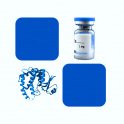
- Remove this product from my favorite's list.
- Add this product to my list of favorites.
Products
Viewed products
Newsletter
 |  |  |  |  |  |

Background
Azurocidin (AZU1) is also known as Heparin-binding protein (HBP), Cationic antimicrobial protein CAP37, is a neutrophil granule-derived antibacterial and monocyte- and fibroblast-specific chemotactic glycoprotein. which belongs to the peptidase S1 family and elastase subfamily. AZU1 / HBP contains 1 peptidase S1 domain. AZU1 binds heparin. The cytotoxic action of AZU1 is limited to many species of Gram-negative bacteria; this specificity may be explained by a strong affinity of the very basic N-terminal half for the negatively charged lipopolysaccharides that are unique to the Gram-negative bacterial outer envelope. AZU1 may play a role in mediating recruitment of monocytes in the second wave of inflammation.
Source
Recombinant Human Azurocidin, His Tag (AZ1-H5225) is expressed from human 293 cells (HEK293). It contains AA Ile 27 - Pro 250 (Accession # AAH69495).
Predicted N-terminus: Ile 27
Molecular Characterization
This protein carries a polyhistidine tag at the C-terminus.
The protein has a calculated MW of 25.0 kDa. The protein migrates as 34-42 kDa under reducing (R) condition (SDS-PAGE) due to glycosylation.
Endotoxin
Less than 1.0 EU per μg by the LAL method.
Purity
>95% as determined by SDS-PAGE.
Formulation
Lyophilized from 0.22 μm filtered solution in PBS, pH7.4. Normally trehalose is added as protectant before lyophilization.
Reconstitution
Please see Certificate of Analysis for specific instructions.
For best performance, we strongly recommend you to follow the reconstitution protocol provided in the CoA.
Storage
For long term storage, the product should be stored at lyophilized state at -20°C or lower.
Please avoid repeated freeze-thaw cycles.
This product is stable after storage at:
-20°C to -70°C for 12 months in lyophilized state;
-70°C for 3 months under sterile conditions after reconstitution.
(1) "Diagnostic and prognostic value of heparin-binding protein in sepsis: A systematic review and meta-analysis"
Taha, Najah, Omar et al
Medicine (Baltimore) (2024) 103 (25), e38525
(2) "Heparin-binding protein as a biomarker for the diagnosis of sepsis in the intensive care unit: a retrospective cross-sectional study in China"
Zuo, Li, Wang et al
BMJ Open (2024) 14 (6), e078687
(3) "Diagnostic value of aMMP-8 and azurocidin in peri-implant sulcular fluid as biomarkers of peri-implant health or disease"
Xanthopoulou, Räisänen, Sorsa et al
Clin Exp Dent Res (2024) 10 (3), e883
Showing 1-3 of 371 papers.
Follow us